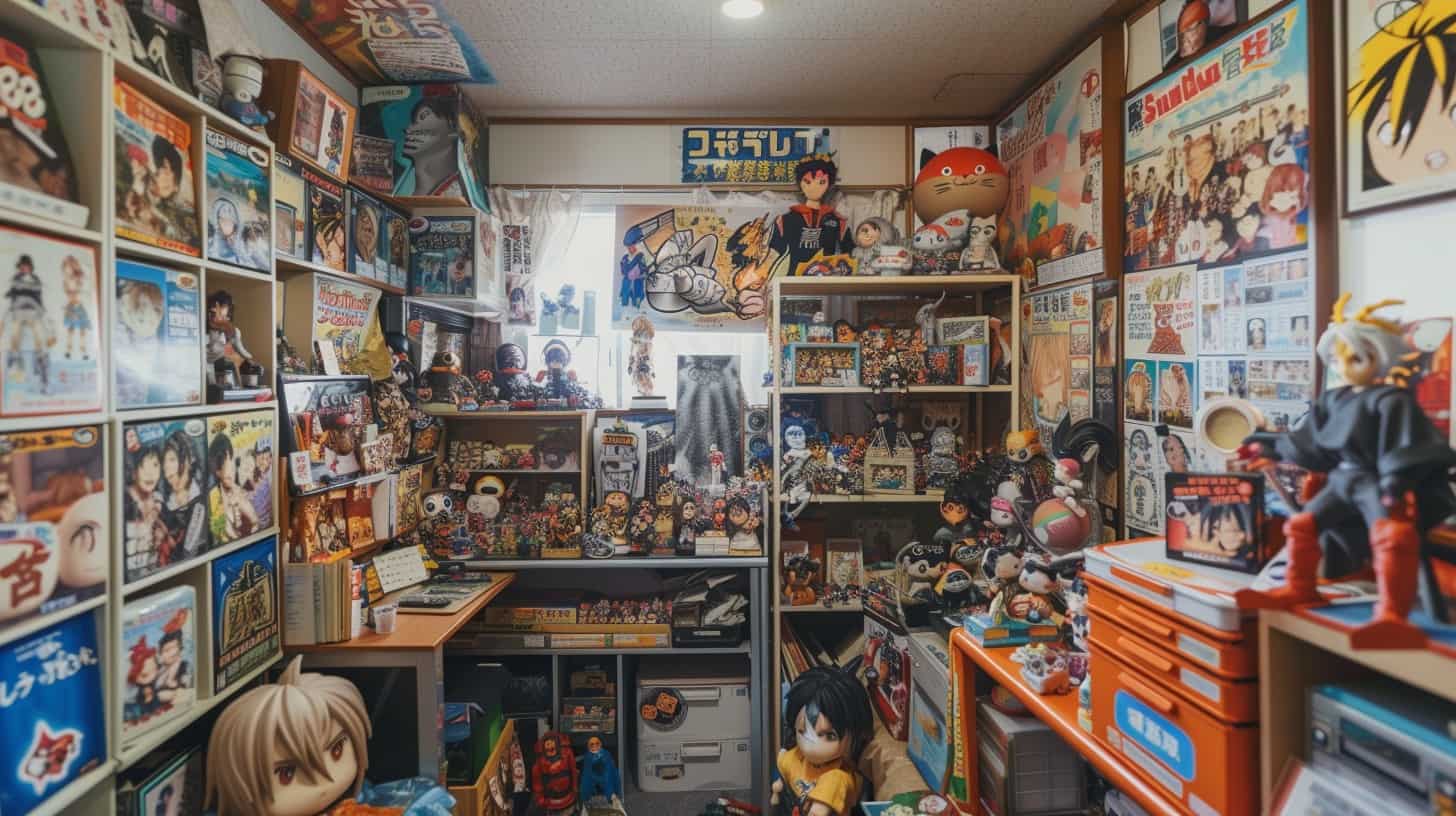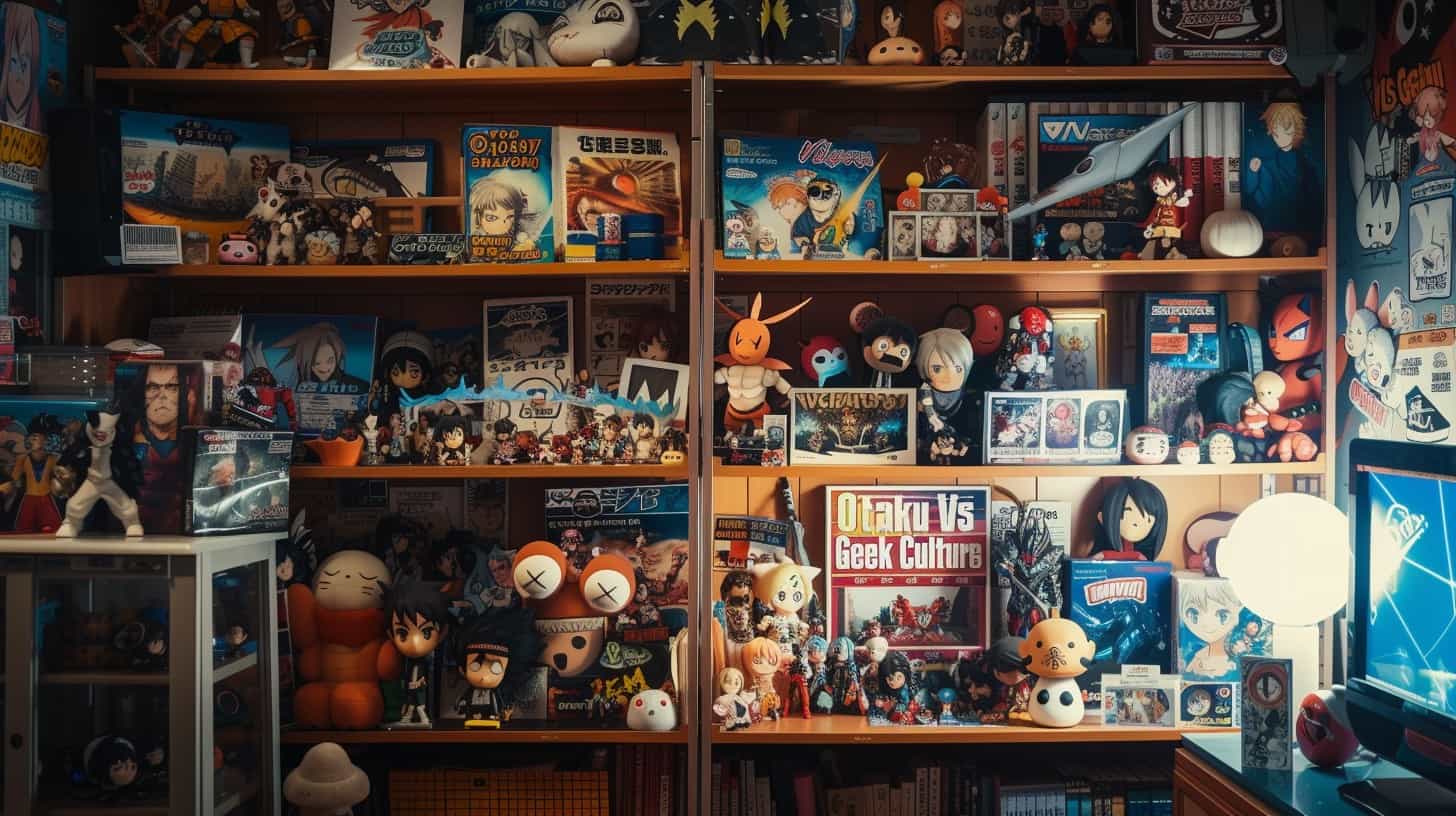Ever felt like you’re swimming in a sea of ‘geek‘ and ‘otaku‘ without really knowing which wave to ride? Here’s a fun fact: while both terms get tossed around like hot potatoes in fan circles, they’re not identical twins.
Our trusty guide here is set to untangle that messy web of “otaku” versus “geek,” giving your brain the lowdown it craves. And guess what? You just might find where you fit on this wild fandom spectrum—let’s dive in!
Key Takeaways
Otaku culture comes from Japan and is all about anime, manga, and video games. People used to think otakus had no social skills, but now it’s cool to be one.
Geek culture is not just American anymore. It’s worldwide. Geeks love things like sci-fi movies, comic books, and technology.
Being an otaku or a geek means you really love certain hobbies. Both cultures are proud of what they like, even if others don’t always get it.
The word “otaku” was once bad in Japan but changed over time. Now people respect the passion for Japanese pop culture.
Geek stuff has become very popular everywhere, with hit superhero movies and TV shows about nerds.
Table of Contents
Defining Otaku Culture

Dive headfirst with me into the fascinating world of Otaku culture; a realm where Japanese anime and manga aren’t just hobbies—they’re lifestyles, folks. This isn’t your grandma’s knitting club (no offense to grandmothers out there—you rock), but a deeply rooted phenomenon that’s taken Japan by storm and is charming cosplayers, collectors, and mech enthusiasts across our big blue marble.
Buckle up; we’re about to explore how “otaku” went from a whispered term in Tokyo’s Akihabara district to a badge of honor worldwide—douzo!
Origin and meaning (Otaku Culture)
So, “otaku” didn’t always sparkle in Japan. Back in the day, calling someone an otaku was like saying they were a superfan with no social skills – ouch! People thought of them as folks who stayed indoors all day glued to their anime and manga collections.
But man, did things change or what? Western culture grabbed the word and flipped it into something cool for people who are just wild about Japanese pop culture.
Anime is huge now – think One Piece-level huge. And with that fame, being an otaku turned into a badge of honor outside of Japan. I mean, we’re talking passionate fans creating art and even rocking cosplay at conventions.
It’s all about sharing knowledge on Yu-Gi-Oh!, geeking out over mech designs from anime shows… you get the drift—it became a way more positive vibe where love for your hobby shines bright!
Impact on Japanese Society (Otaku Culture)
Otaku culture sure made waves in Japan, but not always the good kind. For a long time, folks labeled otakus as weirdos who just stayed in and obsessed over their hobbies. They were kind of outcasts.
But things started to change with this “Densha otoko” business – it’s a story about an otaku hero that saved the day. Suddenly, everyone saw that these passionate fans could be cool and even heroic.
The whole scene began to shift, and being an otaku wasn’t so bad anymore. People got interested in what they loved and realized that being super into something like anime or manga is pretty awesome.
This passion helped spread Japanese pop culture all over the globe because when you love something this much—you gotta share it! Now you can see its footprints everywhere, from blockbuster movies to the fashion on the streets.
And let’s be real—who hasn’t gotten hooked on at least one anime series?
Influence on global pop culture (Otaku Culture)
Otaku culture sure has blasted its way into hearts worldwide, right? Think anime conventions spilling over with cosplay and those quirky maid cafés popping up from Paris to Pennsylvania.
Fans bond over their favorite manga at these spots, just like sports fans do when they paint their faces for the big game.
Oh, and let’s not forget – once upon a time in Japan, ‘otaku’ was a hush-hush word thanks to that otaku murderer scandal. But boom! Along came “Densha Otoko” in 2004, flipping the script.
Now it’s about people with dreams and feelings just like everybody else. You see folks grokking “Shimotsuma Monogatari,” aka “Kamikaze Girls,” beyond the borders of Japan, showing that quirky is cool, no matter where you roam.
Characters blaze past the screen – bursting with kyara-moe elements – snagging fans globally quicker than you can say ‘weeaboos’. It’s not just small talk; otaku culture reshaped what global pop digs today.
Forget about keeping it low-key—nowadays, we shout our geeky love from the rooftops!
Defining Geek Culture

Ah, Geek Culture—now that’s a term as broad and nebulous as the universe in “Star Trek,” isn’t it? Far from just pocket protectors and thick-rimmed glasses (though those have their own retro charm), geekery has left an indelible mark on the good ol’ American psyche—and let’s be honest, if you haven’t at least heard of Comic-Con or can’t quote a few lines from “The Big Bang Theory,” are you even paying attention?
Origin and meaning (Geek Culture)
So, “geek” has had a wild ride, right? It used to be this not-so-nice word for people into circus freak shows. But fast-forward and bam! Being a geek is cool now. We’re talking about folks who love Star Trek, could spend hours sorting their comics, or get super pumped about the latest tech gadgets.
These days, saying you’re a geek is like wearing a badge of honor—it means you’re passionate about something. And it’s not just stuck in American culture; it’s all over the world.
From Ireland to Japan, geeks are uniting over their love for fan cultures and everything that comes with them—from costumes to conventions! Next up: Impact on American Society (Geek Culture).
Impact on American Society (Geek Culture)
Geek culture sure has made a splash in American society. It’s like everywhere you look, there’s a Marvel superhero staring back at you from a T-shirt or movie poster. You can thank geeky shows like “The Big Bang Theory” for making comic book collecting cool and not just something your weird uncle does in his basement on weekends.
Gone are the days of hating on the nerds; now they’re the ones setting trends and raking in likes on YouTube with their killer cosplay outfits and deep-dive theories into every “Star Wars” movie ever made.
They’ve turned what used to be whispers behind books in the library into loud cheers at Comic-Con panels. Yeah, it’s a wild ride – geeks have taken over, and they’re steering this ship full speed ahead!
Influence on global pop culture (Geek Culture)
Geek culture sure has left its mark on the world, huh? From blockbuster movies with superheroes saving the day to TV shows like “The Big Bang Theory,” everyone seems to be speaking geek! You can’t swing a lightsaber without hitting some kind of nerd-inspired merch.
And YouTube? It’s packed with channels where folks show off their love for all things geeky.
Marvel movies have done a lot — they’ve taken nerdy to new heights. Now, it’s totally cool to chat about your favorite comic book heroes or debate over which Star Wars movie is the best.
Gone are the days when loving sci-fi and fantasy was just an underground thing. These passions are front and center, making waves in every corner of pop culture. Who would’ve thought being into comics and games could actually be… trendy? Go figure!
Other Words for Geek

Ah, my fellow aficionados of the unconventional—before we dive into the nitty-gritty of otaku versus geek culture, let’s take a cheeky peek at the kooky cousins in our nerdy nomenclature family: fancy meeting words like “geocach” and “dweeb” that also fly the geek flag high and proud! (But shh… keep it under your superhero cape—we’ve got more juicy tidbits coming up!).
Geocach
In our grand tour of geek and otaku culture, it’s time to spotlight a quirky cousin in our lexicon: ‘Geocach‘. Buckle up because this isn’t your usual geek speak. Hailing from the rolling hills of Gaelic tradition, ‘Geocach’ translates directly as ‘geek’, marrying the world of passionate fandoms with the charm of linguistic diversity.
Who knew? While we’ve been parading our geek flags with pride, the Gaelic speakers had their own cool term brewing in the background. ‘Geocach’ isn’t just another word; it’s a nod to the universal nature of geek culture. From comic book stores in bustling cities to hidden gaming dens in quiet towns, and even those exploring Irish casino sites for virtual adventures, ‘Geocach’ reminds us that being a geek is a worldwide affair, transcending borders and languages.
So, what’s the takeaway? Geek culture is vast, a mosaic of interests and excitements that finds a place in every corner of the globe. ‘Geocach’—our Gaelic tribute—serves as the perfect reminder that whether you’re into anime, comics, tech, or collecting rare action figures, there’s a term, a community, and a space for you.
As we dive deeper into the realms of geek and otaku distinctions, let’s cherish the diversity within our ranks. ‘Geocach’ may just be a word, but it’s a powerful testament to our shared passions and the endless variations they take on around the world.
Nerd
A nerd, ah, that’s a badge of honor in some circles! Imagine someone who loves science like it’s their best friend. They might spend hours with math problems just for fun. Nerds often get excited about things that make other people’s eyes glaze over—like the latest scientific discovery or a new coding language.
A thick pair of glasses? Check. A pile of books? Double-check.
Nowadays, being a nerd can mean you’re super smart and into things like tech or academics. People used to think nerds were only bookworms and study freaks, but times have changed! Nerds come in all shapes and sizes—and they’ve definitely got their own spot at the cool table these days.
Up next: Dave might call himself a geek because he digs comic books, but let’s dive into what really sets apart geeks from nerds…
Dweeb
So, nerds are cool in their own right, but let’s scoot over and make room for the word “dweeb.” This term is a little harsher. Picture someone who loves hitting the books hard or gets all tangled up in social situations—yeah, that person might get called a dweeb.
It’s not as much about smarts like with nerds; it’s more about being awkward or way too into studying.
Urban dictionary throws down some real talk by labeling a dweeb as someone dull because they’re just too focused on schoolwork, or they simply don’t click socially. Hey, we’ve all had our moments, right? Even though this blog isn’t diving deep into dweebs versus geeks and otakus, it’s good to know what flavors of geekiness are out there.
And remember – every group has its own vibe and reasons to be proud!
Fanboy/Fangirl
Oh boy, fanboys and fangirls. We know them well, right? They’re the ones with posters covering their walls and every piece of merchandise you can think of. They live and breathe their favorite shows, games, or comics.
But don’t laugh — that passion is serious business. It means being in line for hours just to get a glimpse of a new release, or having heated debates about who’s the best character.
The fanboy or fangirl life isn’t always easy, though. Sometimes people roll their eyes and don’t get how someone can be so devoted to something fictional. These superfans shrug it off because they find joy in the details – spotting Easter eggs nobody else sees, crafting perfect cosplays, or knowing every word to every episode.
In this crowd, loving something hard is cool – just try not to step on any toes with snobbery while you’re at it!
Enthusiast
So, you’ve got fanboys and fangirls with their hearts on their sleeves for all things fandom. Maybe it’s comic books or the latest superhero movie. Now here comes the enthusiast, right? These folks are like your next-door neighbors who also just happen to collect every single Batman action figure ever made.
They’re passionate, sure—but they’re not about to wallpaper their room with Marvel posters.
An enthusiast is someone who dives deep into what they love—from vintage cars to French poetry—and they know a heck of a lot about it, too. They might spend weekends at conventions or nights reading up on rare comic book issues, but they do it because it lights them up inside.
This isn’t just fun and games; it’s serious business for enthusiasts. But don’t be fooled! While they may not dress up as their favorite character from “Star Wars,” their knowledge can outshine any costume.
The Key Differences Between Otaku and Geek Cultures

Ah, the epic showdown – Otaku versus Geek culture; it’s like comparing manga with comic books, yet there’s so much more beneath those nerdy surface levels that you’ll want to dive into… and trust me, we’re not just splitting hairs here!
Differences in interests and hobbies
Otaku folks dive deep into Japanese culture, from anime to manga and video games. Their passion often focuses on the latest series out of Japan or collecting rare action figures. You might find them at conventions dressed up as their favorite characters, a practice called ‘cosplay.’ On the flip side, geeks get excited about all sorts of things – tech gadgets, sci-fi movies, comic books, you name it! They love to dig into the details and learn everything there is to know about their obsessions.
Geek culture has spread its roots far beyond American soil; it’s now a worldwide phenomenon, with fans connecting over shared interests online. This global community thrives on knowledge exchange and celebrates geeky milestones together.
Now let’s talk about how people view these cultures socially…
Social connotations
Geek culture, you know, it’s kind of like wearing a badge of honor. It says, “Hey, I’m super into this and proud of it!” But the otaku crew? They’ve got a different vibe in Japan. People sometimes see them as over-the-top fans who are way too into their anime and manga worlds.
Think maid cafés and characters that make hearts race—that’s otakus’ jam.
Now, geeks everywhere have felt some side-eye for being deep into their passions, whether that’s tech stuff or comic books. The good news? Times are changing! Geeks are often seen as cool now—smart brains with quirky hobbies are in style.
Otaku folks in Japan, though, get mixed reactions—some think they’re awesome collectors and creators, while others might not understand why they’re so devoted to fictional characters.
Cultural impacts
Otaku culture has really shaken things up, especially in Japan. At first, many folks saw it as weird; otakus were often laughed at or not taken seriously. But guess what? This same culture slapped a giant impact sticker on Japan’s society! It started changing the way people see hobbies and fans.
Cool anime and manga stuff began popping up everywhere, from giant billboards to everyday fashion.
Now let’s chat about geek culture. Its footprints are all over the place in America, too. A while back, being called a geek might have been like getting hit by a dodgeball – not fun! These days, though, it’s a badge of honor for many out there who dig tech and sci-fi like nobody’s business.
Geek ideals have nudged their way into Hollywood, with superhero movies ruling the box office and TV shows about nerds becoming super popular.
Both cultures have left some serious marks worldwide, too. Global pop culture now gets its sparkles from both Otaku and Geek worlds — kawaii conventions here, comic cons there… You get the picture!
FAQs About Otaku vs Geek
What’s the main difference between an otaku and a geek?
An otaku is really into Japanese culture, especially anime and manga, while a geek dives deep into stuff like tech, games, or sci-fi.
Can you be both an otaku and a geek?
Sure thing—you can totally love anime and be all about the latest gadgets at the same time!
Do otakus have their own events to go to?
Yeah, they’ve got cool conventions like Anime Expo where they can meet others who dig the same stuff.
Are geeks into collecting things as much as otakus?
You bet—geeks often collect things from their fave movies or games, just like otakus collect anime figures.
Is it okay to call someone an otaku or a geek?
Well, some folks wear these labels with pride—just make sure it’s all in good fun when you say it!



